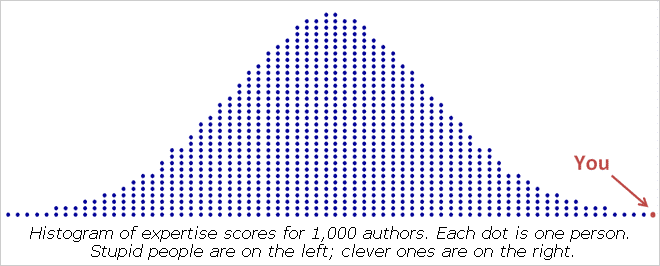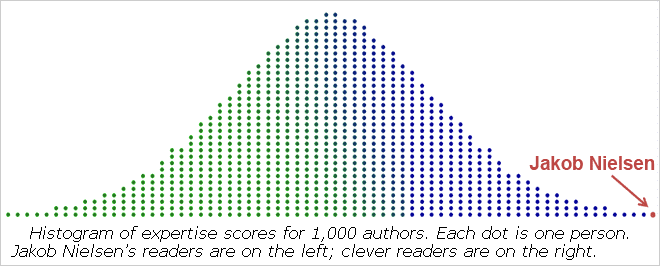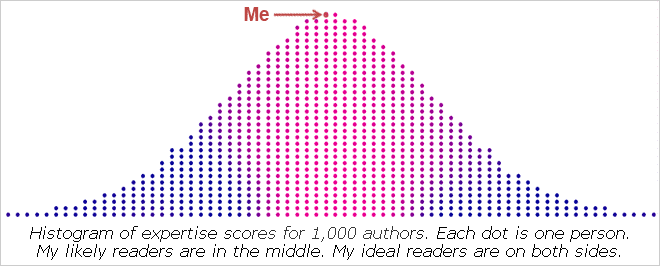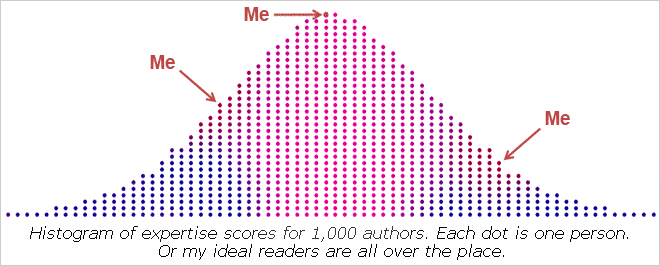
Several bloggers I know have confessed to me that occasionally they’ll compose and publish articles or posts that they don’t feel especially passionate about, writing things that they aren’t particularly proud of or inspired by, simply because they know that certain topics, ideas, or opinions will give them an easy and predictable traffic boost.
For example, they may sometimes “dumb down” or oversimplify their normally nuanced perspective, or they will overly sensationalize their opinion, or maybe they will take a firm position on something they don’t actually feel very strongly about at all, almost out of a sense of obligation. They will do this to reach out to a broader web audience, to attract new readers, to fire up or inspire their regulars. They will, in short, “write down” to their audience.
I have no problem with this, by the way, since I do it myself now and then. It’s something every blogger has to grapple with: Write for myself? Or write for the people who I want to visit my site?
Jakob Nielsen’s latest AlertBox, “Write Articles, Not Blog Postings” (in which he suggests that a writer’s biggest audience consists largely of people dumber than they are) makes me wonder just where I stand with respect to you, my own reader. Do I want you to look up to me? Do I look up to you?
The Bell Curve
Nielsen’s essay opens with the following short summary:
To demonstrate world-class expertise, avoid quickly written, shallow postings. Instead, invest your time in thorough, value-added content that attracts paying customers.
(Okay, this is a perfectly nice and pithy insight, something to take into consideration when devising an editorial strategy, I suppose. Still I can’t help but laugh at the double irony that follows this abstract. First, Nielsen spends the next several thousand words defending this “no duh” thesis not only by violating Steve Krug’s elegant “Omit needless words” web copywriting strategy, but also by trampling all over his own admonitions to online brevity. And in an almost comical measure of Nielsen’s attempt to avoid hypocrisy, this edition of the AlertBox seems to be packin’ a higher word count than many of his usual, shall we say, “quickly written” AlertBox postings.)
The essay also includes a diagram that seems to capture Nielsen’s core idea that a good content creator must look down on his or her readership. The diagram explicity suggests that bloggers should try to “dumb down” their ideas to reach the broadest possible audiences, the same big audiences that less qualified writers are reaching.
In this diagram, Jakob asks us to imagine that we are a leading expert in our field and that our content has immense value to our audience (an important assumption for any writer or publisher to make!!). He puts “You” at the head of the class, on the right side of the graph. He then plots out other writers — your competitors — and shows that many of those writers who are “less expert” than You clearly draw a far bigger audience than You do.

Notice how this diagram implicitly assumes that the most valuable audience (that is, the biggest audience) for any given content producer are those readers whose “expertise” is half that of You, the publisher/producer. If You want to reach the broadest possible audience then, according to Nielsen, You should aim not for the thin dimwit end of the scale on the far left, nor should You aim for your own immediate peers in the slender expert end on the right, but You instead should aim for the big fat mediocre center of the bell curve.
Of course those who are more expert than You simply don’t show up on Nielsen’s chart at all, which probably speaks volumes about Nielsen’s self-image. If you read between the lines, then it becomes clear that the more expert You are in the world of usability and user experience design, then the less useful Jakob Nielsen’s AlertBox will be to You, since presumably Nielsen is following his own advice and generally writing for an audience half as “expert” as he is. (Note: All of the following diagrams have been altered from Nielsen’s original.)

Bloggers and their Readers are Equals
But this is where I think Nielsen misses the mark the most: If there is any real social innovation to blogging, it is the fundamental destruction of the age-old (and IMHO baseless) assumption that simply by virtue of being a content publisher you are automatically superior to the people who merely consume what you publish. Now anyone can publish anything they want to a broad audience, and the lines have been blurred: between formal and informal writing, between fact and opinion, between institutional and personal perspectives.
Of course, many great blogs make deliberate decisions to gain or retain popularity by, for example, publishing often on topics their readers seem to enjoy most, or avoiding alienating readers with controversial content (when was the last time Signal vs. Noise posted something about politics?). But in the world of blogs this is the exception, not the rule. Bloggers generally have the freedom to publish primarily for themselves when they want to, and most of us exercise this freedom fairly often.
Bloggers Want to Reach Upwards
What’s more, bloggers publish aspirationally, hoping that people smarter than us will notice us and read what we have to say. This may not be how Nielsen sees his job, but that’s how I work: I write graphpaper.com assuming that readers of all kinds will reach my site, some less expert than I am, some more. I know that people at the “stupid” end will stumble into graphpaper.com now and then, but at the same time I am always hoping that people at the “expert” end will find something they enjoy here as well. Assuming that my audience is entirely “dumber” than me is not just arrogant, it’s simply not an option.

And because I have the freedom to publish on whatever subject I wish, from user experience design to art criticism, from politics to my personal life. The subjects of my posts will even sometimes land me way over my head on a subject I know little to nothing about (see “Me”, left, below), which can be at best amusing and at worst humiliating.
But this freedom also allows me to occasionally write about something I think my professional peers might find interesting and useful (see “Me”, right, below), something that I genuinely have “expertise” in. In other words, I can be all over the bell curve.

As is clear, there is no real “juicy center” to my audience at all. In all honesty, my audience, in my mind, is generally (a) me and (b) certain people I know and respect. My editorial capriciousness is hardly a good example of user-centered design, and it’s probably also bad business (in that it probably doesn’t help grow graphpaper.com’s loyal readership base). But it’s how blogs work, it’s an essential, fundamental dynamic of today’s user-generated/self-publishing culture.
Comments
14 responses to “Should Bloggers Assume that Their Readers are Dumber than They Are?”
I skipped your whole Nielsen section because it made me mad first time round.
I think, when we write, we should write for our peers. Not up, not down. I hope I do that. Writing down is condescending and soul-destroying.
I admit to sometimes making a point in a slightly more extreme manner than what I actually believe. Not to get a traffic boost, but because middle-of-the-road doesn’t inspire thought or discussion.
“But this is where I think Nielsen misses the mark the most: If there is any real social innovation to blogging, it is the fundamental destruction of the age-old (and IMHO baseless) assumption that simply by virtue of being a content publisher you are automatically superior to the people who merely consume what you publish.”
Well said, Chris. His egotism is what gets me. It’s impossible for me to respect someone who is so damn full of himself.
And, to Donna’s point…I agree that we should write for our peers. I’ve struggled with this myself…as I have been in the habit of writing in an expert-like tone. Though I don’t consider myself an expert (except, maybe, in confusion) I have tended to write like that…not sure why…and I’m really trying hard to rid myself of that horrible affliction.
If you write as an interested and passionate peer then you’ll have the most success. I have proven this over and over on my blog. You can know a lot about what you’re writing about, based on your own experience (which may or may not be more than your readers), while still realizing that each of us has something to add to a conversation.
Neilsen makes two main mistakes: he assumes that what’s important is intelligence rather than prior knowledge; and because of that he assumes a bell curve distribution and not a power law distribution.
What’s key in your audience, generally speaing, is not whether they are “stupid” or “clever”, but how much expertise they have in the area you are writing about. Certainly in niche audiences, it’s going to be a power law distribution – a few people will know lots, but most people won’t. However, if I write in an engaging and intelligent manner myself, I can appeal to people from all over the place, whether they are existing experts or whether they are new to the topics I am writing about, and regardless of their intelligence.
I’m sure there are a few blogs where your IQ becomes an issue. If someone’s writing about particle physics or molecular biology, then I’d bet they would attract readers with a higher than average IQ, but I’d also bet that knowledge of the subject area would still be more important, not to mention the writing skills of the blogger.
So I’m basically of the mind that Mr Nielsen is talking claptrap, and proving himself to be on the left-hand side of his lovely diagram.
I read Neilsen’s post yesterday and have been stewing on it since. It made me more than a little angry. He’s managed to prove to me again that he’s well out of touch with most of the people he should absolutely be in touch with.
I’ve been trying to think how to respond, and now I don’t have to – at least not at the great length I was keying up for. You’ve said it all, and it’s spot on. I have no desire to be the most expert in what I blog about (a nice idea, but very hard to maintain) and I consider myself a peer of my audience (not some superior being).
For me, Neilsen has proved once again that he’s like that uncle people feel compelled to invite to family events, but wish they didn’t have to as they know he’s going to say something that’s going to make everyone angey, embarrassed or uncomfortable. He’s desperately out of touch.
[…] Follow any comments here with the RSS feed for this post. Post a comment or leave a trackback: Trackback URL. « Speaking atOz-IA […]
“Jakob asks us to imagine that we are a leading expert in our field”
Funny, in my “fuzzy tail” deck I ask people to do the opposite—to not think of themselves as experts as IMO this leads to more creativity—and better solutions.
Chris, I think your post raises a lot of valid points. I would add one more. I think Jakob totally misses the nuance that folks will find value in your blog if they find you (or your company/brand) to be INTERESTING. Being interesting has nothing to do with short or long posts, but it’s one of the main reasons that people will keep coming back for more.
If you have something interesting to say, something unique and memorable—a blog will likely do well. Jakob misses this because everything I’ve just stated is sort of intangible. Hard to pin down. But you know it when you see it. Unless you’re Jakob apparently. 😉
Well put, Chris – especially the bits at the beginning that deftly pull aside the curtain on Neilsen’s disregard for his own guidelines. Maybe in doing so, he’s simply proving that all bloggers – even he – really do write for themselves, since he’s plainly only writing for who he imagines his audience to be.
We should start a pool to pick the date when the balance of Jakob’s missives became so throughly irrelevant that he began to serve more as a caricature of his own utterances gone awry than as a guide to sound practices and a valuable perspective.
I’m staking my claim to the first quarter of 2003, though that may be overly generous, given his consistent going on about about micropayments that predates this range.
What’s your first choice?
I’m sure I’m opening a can of worms here, but I’ve re-read the Useit alertbox a couple of times and think the diagrams and wording are causing the problems here.
I read the AlertBox as being focused towards businesses looking to use blogs as a way of stating their expertise. The gist of what I’ve understood is this:
Don’t consider a blog (as in a large number of posts, with a comment system) as a way of proving your expertise in your specialism, as there are plenty of chances for you to write sub-standard posts that will de-value your reputation. Instead write regular, valuable, well thought out articles that will help to cement your place in the ‘expert top 100’.
I think the dot graph, an example that would probably upset Edward Tufte, was badly explained too. I understood the graph to represent ‘You’ and other specialists writing about a similar subject, and not visitors to ‘Your’ site; where if ‘You’ are the leading expert, and are the smartest, the bell curve is at it’s thickest where there is the highest number of people who are of average intelligence (and doesn’t represent the number of visitors to ‘Your’ site).
I’m not a big fan of the broad brush strokes that Neilsen often paints, but if there was a better introduction instead of the sensationalist, self aggrandizing prose that is there then I’m sure people’s backs wouldn’t have been put out quite so much.
I hope I’ve offered another viewpoint – please let me know if I missed the ball on this one.
@Les: I understood Nielsen’s chart, and I think I described it fairly even if I didn’t go into it in depth. Each dot represents another author, not a reader, and that’s an important distinction. But his own interpretation of the curve seems to be that the vast majority of readers can be found reading those “not-too-smart-but-not-too-stupid” authors in the big hump in the middle.
Anyway, I was really focusing on the basic assumption (“For the sake of argument”, he says) that an author should even consider the possibility that they are the world’s #1 expert on anything, especially in the realm of blogs. Few people, and Nielsen is certainly not one of them, should approach their writing or their own expertise with such an attitude.
Ultimately you are correct about your interpretation of his point, too: He is clearly talking specifically about writing for business, not writing for personal expression. But he is clearly saying “Stop blogging“. This is, IMHO, just stupid — countless businesses and even more individual professionals are proving that blogging, even with its risky elements of brevity, sponteneity, and (most importantly) the comment/feedback loop, is a powerful marketing, branding, and customer relationship tool. He caricatures the use of blogging as a customer relationship tool as the domain of small-time online pistachio vendors, ignoring its potential for long-term relationship-based businesses.
Everybody should write better of course (do we need Jakob Nielsen to tell us that?), but it’s backward and reactionary to exclude the core strengths of blogging — brevity, intimacy, and reader feedback — from your professional communication strategy.
The ability for a blog to quickly and effectively communicate with your customers can not be overlooked. Customers like to be able to know whats happening in a timely fashion. Also the customer feedback developed by blogs can help companies rapidly respond to any important issues.
@Christopher: I see your point. I wasn’t saying that you has misunderstood his chart, just that the chart combined with the text combined to confuse the issue, and not put the point across too well. Please accept my apologies if you thought I was criticizing what you had written in your post.
I think with anything online, there is always the potential for an article to be interpreted a million different ways; I guess I had read the initial AlertBox and thought “ah, he’s speaking to a particular audience here, and that’s not me”, but I can see how if you apply the ‘Stop blogging’ argument to everyone it would cause a lot consternation.
I agree that blogs are very beneficial to some companies wanting to strike that level of conversation with their customers, but for others (maybe the big ‘world leaders’?), blogs could be detrimental to their other efforts in customer satisfaction if implemented wrongly. I read Jakobs piece as a warning to ”experts’ in their field, that the quality of their posts would not consistently be high enough to support the expectation behind their brand or corporation. I don’t agree with that necessarily, but I can kind of see where he’s coming from.
I guess for me, as a ‘dormant blogger’ and long time builder of interactive stuff, Jakob Neilsen always comes across as a “Do as I say, my word is Law” kind of person, and I just take a slightly more detached view of what he writes. In my experience, I try to take what he says with a large pinch of salt – there’s a reasonable amount of research behind his pieces, and it’s all in the interpretation…
Good grief! I apologise for the terrible english in my last comment. I hope it’s a combination of too much coffee this morning, and sloppy typing. I hope.
@Lee: No offense taken, I’m sorry if I made it sound like there was. Everything Nielsen says must be taken with a grain of salt, of course, and in some contexts he actually does make a lot of sense.
Hi all,
Interesting discussion. Here’s my take.
The problem with writing down to your readers is, you do a gross injustice to yourself. Not allowing yourself to follow your most random, yet most fascinating train of thought. Because “your readers won’t be able to follow” (stuff on Jakob Nielsen). You’re shortcutting yourself. Underestimating yourself.
But – maybe worse – fooling yourself, too: you are just afraid to look stupid if you show all of your rambling, (seemingly) unconnected thoughts. Your doubts, second guesses, backtracking. Here’s the thing: it’s all been done! We’ve all been there! And isn’t free association, sidetracks, and plain mistakes how the most interesting ideas or creations come to be? What can be more inspiring than to be allowed a peek into someone else’s thoughtprocess? More freeing, unlocking your own secret thoughts of how brilliance would look like on the inside? Oh, actually, just like the inside of mine!
And what good is a solid, tightly closed, impenetrable argumentation, anyway? Isn’t that just boring? And what’s up with research? Don’t we all know when something feels right? Don’t we show it by reacting? Ignoring stuff that’s not interesting or plain wrong? It just seems defensive to me. No room for doubt guys, look at all the 1000 people who felt the same way – according to my experiment, the way I set up the situation. I, for one, am always more interested in the dissident. How many questionnaires have you filled out that just didn’t seem to ask the right questions?
The trouble is with any kind of fame or recognition, it tends to stifle creativity. Because the fame is addictive. The famous person so wants more of his fans applause, that he can’t turn off the thought that he has to please them. So he’ll continue to do what he did to make him famous. It’s not just the repetition – in itself quite possibly a fierce enemy of creativity. To me, it shows itself by the mistakes I start to make. My (o! so creative!) body simply won’t allow for much repetition. But what’s really fatal, is the need to please others (believe me, it takes one to know one). It may cause you to lose touch with your own sense of passion. The very spark that’s the reason people started to love whatever it is you do.
For what it’s worth.. I certainly love blogging and writing because I can ramble freely! Now, I’m off to assess my own inner pleaser sternly… ; )